Location: Khartithok (Kavresthali) & Thumki (Jitpurfedi)
Dates: 19 December 2018 (Thumki) & 20 December 2018 (Khartithok)
Workshop delivered by Patricia Iacob and Chiara Caminiti (EU Aid Volunteers on gender issues) with the help of Razni Karki (local volunteer).
Text by Patricia Iacob and Chiara Caminiti
Photo credit: Patricia Iacob
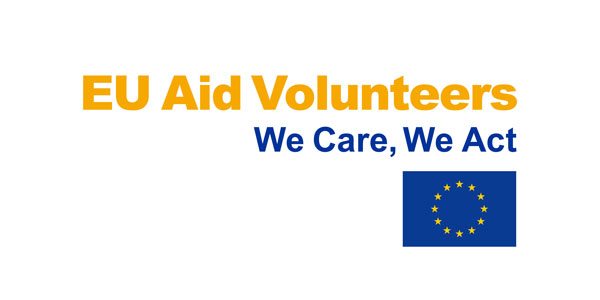
Second in the series of life skills workshops organised by Volunteers Initiative Nepal under the Women Empowerment Programme, after an initial awareness-raising session on domestic violence, the re-enforcement of personal identity and awakening of self-esteem of participating women was the logical step to be pursued. Bound by harsh, busy daily lives, women in the Kathmandu Valley villages have little, if any, opportunities to be active participants to their communities. Or to realise their potential and important role in the society, starting from the family and expanding to the society at large. This workshop provides an excellent opportunity for them to build on their self-esteem, gaining independence and self-confidence to be the much-needed actors of change in their respective communities.
The term self-esteem is used to describe a person’s overall sense of self-worth or personal value, how much one appreciates and likes oneself. That involves a variety of beliefs, emotions, and behaviours, often influenced by a local culture. In this rural context the border between personal identity and community is often too thin and is difficult to find a space to define, recognize and
accept oneself. The women need to turn a bit inwards, to explore their innermost core and stay with their emotions, to realise who they are, what they dream of and what they can achieve.
Self-esteem and identity awareness are somewhat abstract concepts; it’s hard for someone who never takes time to reflect on that, to understand, recognize and develop these dimensions in the daily life. For that we used an interactive and participatory modality that allowed women to experience, to feel, to discover themselves in a safe space, which we are constantly trying to build, meeting by meeting, with the groups of women. Also, the dimension of the group is an important element for a woman to explore her identity and to built trust in herself and in her relationships at large. The group is an active support that can promote the achievement of goals as well as development. Lastly, given the low literacy levels of the community women, we resorted to art as a method of self-expression which could guarantee the efficiency of our endeavour.
To maximise the impact of the workshop, we collaborated with a local volunteer, Razni Karki, who translated and adapted all the material, also taking a lead role in its delivery. This helped women feel at ease, safe and encouraged to open up to the interactive exercises and thus make the most of the encounter. The two communities involved were Thumki (Jitpur Phedi) and Khartithok (Kavresthali), where the workshop was attended by a total number of ten and six women, respectively.
Structure and findings
1. Warm-up session
As usual, our workshops begin with the fostering of a sense of connection within the group by a hand-holding warm-up, where all participants stand up in a circle, say their names and clap to a different rhythm at each one of them.
2. The talent map
To get a sense of women’s self-esteem, we drew on a paper a big shape of a hand. The hands are the symbols of what we can do and what we do daily, “our talents are in our hands”; being aware of our capacity and talent is important to strengthen our personality, awaken self-esteem and reach our goals. The use of an easy metaphor should help the women in their daily lives. Every finger represents a specific area: the thumb stands for talent, the index finger for activity, the middle finger for emotions, the ring finger for network and the little finger for difficulties, on which we asked women to reflect.

Generally, women identified as talents their normal household chores, such as cooking, planting, looking after children, cleaning, worshipping, but also dancing, singing, knitting, and sewing. They use these capacities in their daily lives performing activities like cooking for large numbers of people, singing on their free time, dancing at ceremonies, opening up a beauty parlour or an orphanage for needy children. Asked about emotions, the women expressed the desire to gain mainly working skills such as sewing, knitting, farming that would help them find a job and get an income. Education and traveling were also among their priorities, as well as freedom and gender equality. When it came to building a network that would help them improve their talents and capacities, the women mentioned family, neighbours, community groups (such as the agriculture and the savings ones), knowledge and VIN as useful channels of support to this end. Their difficulties are the lack of income, the absence of skills, illiteracy, poor hygiene and lack of safe drinking water, poor transport, and domestic violence. The lack of trust and support from the family ranked high among their daily problems. Many women reported being scolded by their male family members if food does not satisfy their palates.
3. The personal mandala
Using the Mandala circle as a visual tool that enables us to become aware of our life in general and to reflect upon our main priorities, we asked the women to freely draw and colour the six sections of the circle corresponding to the priorities we highlighted, that is, family, health, social network and community, work, self-time and spirituality. The choice of the Mandala symbol was made bearing in mind its belonging to Nepali (Hindu) culture and its relation to inner transformation and harmonious balancing.
We noticed that women got involved in the exercise to the point of getting carried the way by the drawing, especially with the Nepalì music background we provided. Some women had a good insight of the exercise and either left section blank or half-filled, such as the one of self-time. Most of them used the orange as a symbol of their spirituality and flowers, grains and animals to represent their work and community. However, the low literacy levels impeded some of them to delve deeper into the task, which was finally a colouring session without personal involvement. Notwithstanding, they generally appreciated the originality of the activity and were really proud of their artistic production at the end. They kept their mandalas to remind them of the special moment they had passed to acknowledge and re-enforce their identity.
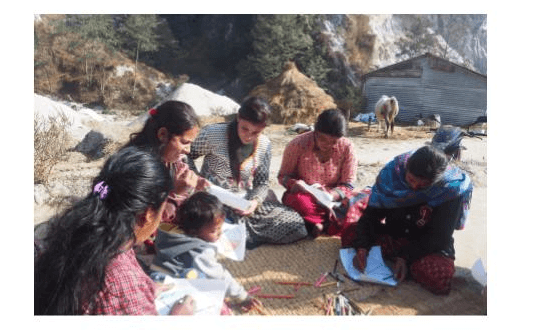
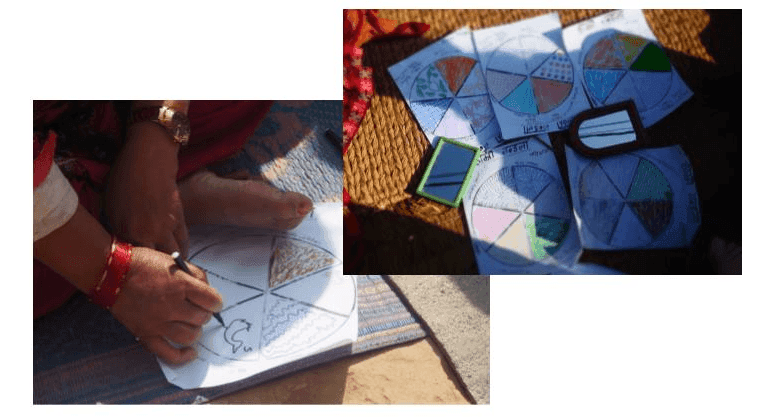 4. Awareness meditation
4. Awareness meditation
A short meditation on self-awareness was conducted, during which women were encouraged to look deep into themselves and see their inner beauty. Gradually, they opened their eyes and looked at themselves in mirrors held by the facilitators. They were then encouraged to make eye contact as a token of gratitude for the shared experience.
This was a sensitive and delicate exercise, which left many women with soft, watery eyes. The short moment of introspection brought them back past feelings, worries, doubts, even joys that they have no opportunity to express at their fullest. Unfortunately, the impact of the meditation was severely diminished by the privacy-deprived premises; conducted outdoors, with constant distractions such as little children, men stopping by, and trucks carrying sand from the local factory, it was particularly challenging to instil the peace and calm we had sought.
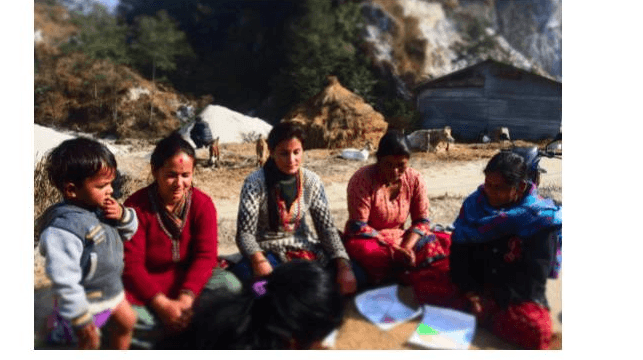
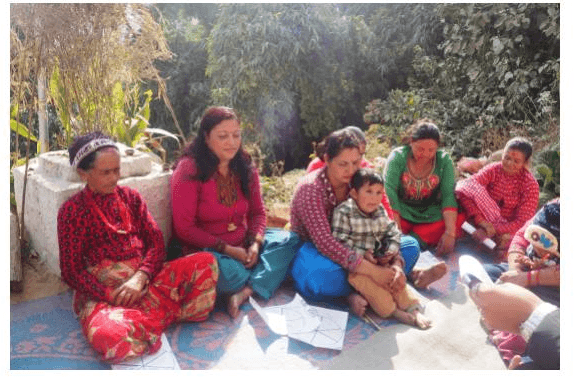
5. Ending circle
The final hand-holding circle, which for one of the groups turned into a short singing-dancing gig (a stimulating practice of their talents), encouraged women to express their feelings about the session. Generally, they acknowledged the usefulness of the workshop as an opportunity to get a look into their inner selves, a much-needed moment of respite from their daily chores. They were rather shy at expressing deeper feelings. For many of them, however, it was difficult to perceive the importance of the exercises. Old and illiterate, having led lives of servitude where they are so engulfed in daily chores that literally have no time to think of themselves, self-knowledge is a true challenge. Notwithstanding, they admitted that something was stirred inside and they caught a glimpse of a different perspective on life and themselves.
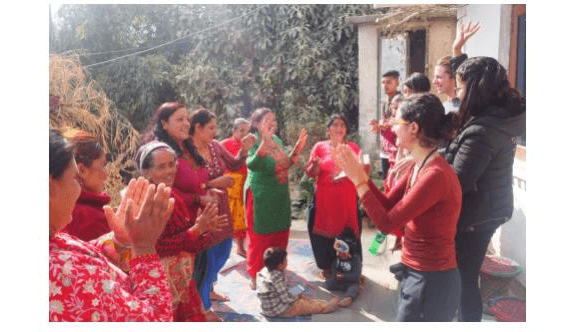
Observations and conclusions
After the delivery of these two sessions of the workshop on identity awareness and self-esteem, we can conclude that it had an impact, although only time can tell whether or not the message was assimilated in depth. The women were engaged enough and satisfied at the end, despite the distractions mentioned above. It was the same distractions that also forced us to alter the content of our workshop. For example, we had to eliminate completely a step called “the walk of trust” which would have implied the women walking in pairs, blindfolded. The outdoors setting and the constant attention paid to passers-by as well as the women’s shyness and fear of being judged by the others made this activity impossible to perform. But this is also an indicator of how difficult it is for women to step out of the rules and rhythms imposed by their society. Another example of the prevalence of how society is shaping the women’s daily schedules and priorities – which we, as facilitators, have to acknowledge and welcome as an important part of their identity – is that of the general late start times of our sessions. Especially when it comes to religious ceremonials (puja), women would only attend a workshop after the puja has been finished, which is a challenge but also a good exercise for our patience and flexibility.
Another inevitable distraction that comes with the outdoor premises of the workshop is the constant presence of men, either family or passers-by. More than curiosity, they give an impression of the desire to control the content and even rhythm of the workshops. For example, a male relative attempted to shorten one session by claiming that women had to return to their household chores, namely cooking the daal bhat as the first meal of the day. This is deeply disturbing for the inner work that we are trying to do with the local women.
Lastly, while expressing their satisfaction with these life skills workshops as it enables them to turn inwards and share feelings with the others and with the facilitators, the women also requested the delivery of more practical workshops, focused on sewing, knitting, farming, soap-making, etc. that would generate income. According to them, the lack of income is the biggest problem they are facing in their daily lives. Therefore, the life skills series will be re-enforced with additional training sessions to develop the practical skills requested, putting women on the right path to becoming autonomous, self-realised and empowered actors of their own lives and their communities.
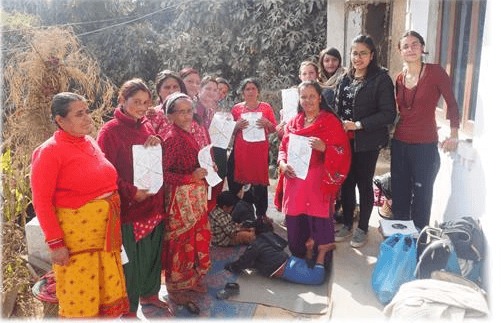
Published on: 23 Dec 2018

 Member of
Member of